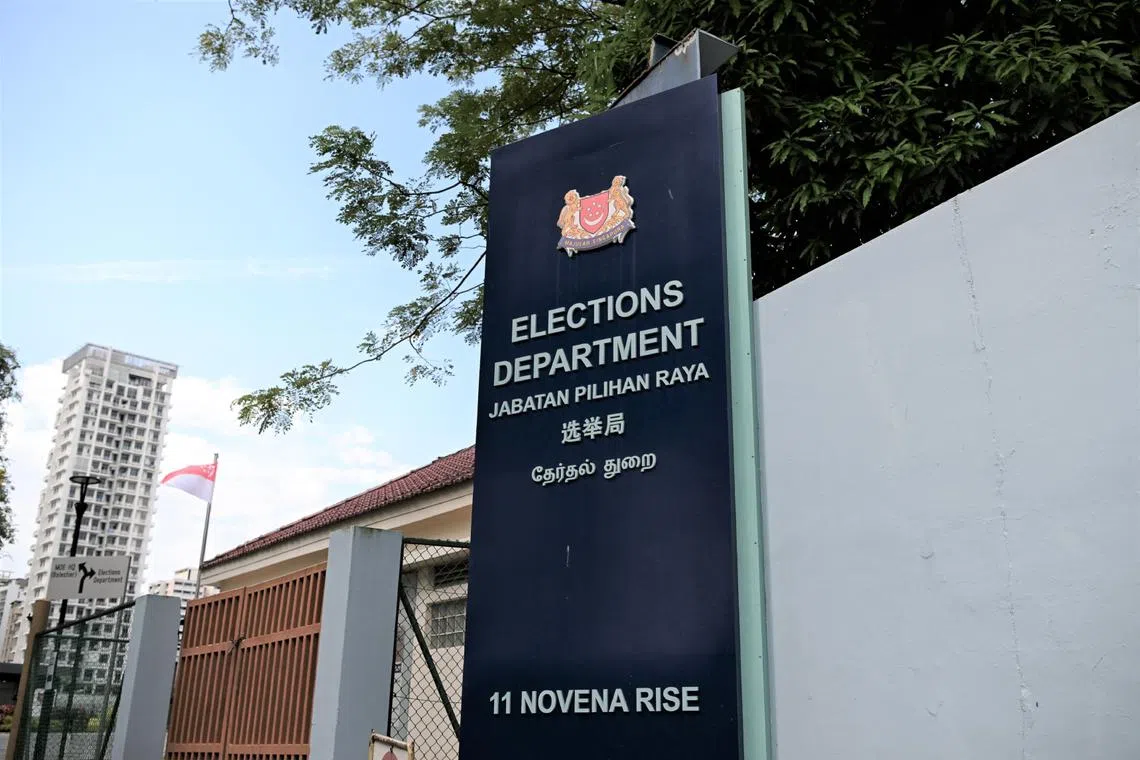Publishing, reposting or sharing of election ads not allowed on Cooling-off Day: IMDA, ELD
Sign up now: Get ST's newsletters delivered to your inbox

Online ads that had already been lawfully published before Cooling-off Day, and remained unchanged after its publication, need not be taken down.
ST PHOTO: KUA CHEE SIONG
SINGAPORE - All Singaporeans are allowed to put up unpaid online election advertisements of their own accord, but publishing paid advertisements is allowed only for candidates and their election agents.
Those who are not candidates or election agents can publish paid online election advertising only if they receive written authorisation from a candidate or election agent following Nomination Day, the Infocomm Media Development Authority (IMDA) and Elections Department (ELD) said in a statement on Tuesday.
All paid ads must be declared to the Returning Officer by the candidate or election agent, and abide by existing requirements.
These include displaying the full names of those responsible for publishing it, those who approved the content, those who directed that the ad be published, and who had paid for or sponsored it.
IMDA and ELD added that Singaporeans who are not candidates or election agents do not have to follow the published-by requirements above if they post unpaid online election ads in their individual capacity, and not at the direction of others.
Singapore will go to the polls on Sept 1
These details were revealed by the ELD, after Prime Minister Lee Hsien Loong issued the Writ of Election last Friday.
So far, there are four presidential hopefuls: former senior minister Tharman Shanmugaratnam, 66; entrepreneur George Goh, 63; former GIC investment chief Ng Kok Song, 75; and former NTUC Income chief Tan Kin Lian, 75.
Tuesday’s statement also reminded Singaporeans that election advertising, whether paid or unpaid, is not allowed on Cooling-off Day, which is on Aug 31, and Polling Day.
Online ads that have already been lawfully published before Cooling-off Day, and which remain unchanged after their publication, need not be taken down.
But republishing such existing ads is considered to be publishing fresh ones, and that is prohibited on Cooling-off Day and Polling Day.
Examples of this include sharing, resharing, reposting or boosting existing online election ads.
IMDA and ELD added that the outcome of Singapore’s elections must be for Singaporeans alone to decide.
Non-Singapore citizens are prohibited from taking part in any election activity and from publishing or displaying any election advertising during the election period, which is from when the writ is issued till Polling Day.
The statement also said that publishing the results of an election survey, or any content that appears to be the results of such a survey, is not allowed during the election period.
An election survey is an opinion survey of how voters will vote at an election, or of the preferences of voters with regard to any candidate, or any issue which an identifiable candidate is associated with at an election, said IMDA and ELD.
Publishing exit polls is also not allowed during this period.
This includes a statement on how voters have voted at the election, or forecasts on the result of the election, where the statement or forecast is based on information from voters after they have voted.
Party political films and foreign interference
The statement also reminded people not to make, exhibit or distribute party political films, which include films made by any person and directed towards any political end in Singapore, such as those intended to or likely to affect voting in an election here.
The law exempts certain types of political films, such as live recordings of events held in accordance with the law and factual documentaries, biographies or autobiographies.
Candidate declaration of policies or ideology on the basis of which they seek to be elected that is produced by or on behalf of the candidate, and films made solely for the purpose of reporting news by a licensed broadcasting service, are also allowed.
“In using film as a medium to conduct political discourse, all persons should respect the need to keep politics rational and grounded on facts. This ensures that the political debate in Singapore is conducted in a responsible and dignified manner,” said IMDA and ELD.
Separately, on Tuesday, the Ministry of Home Affairs, the Cyber Security Agency of Singapore and ELD put out an advisory to presidential election candidates about the threat of foreign interference and cyber-security risks.
It warned that foreign interference includes attempts by foreign actors to manipulate domestic politics through covert and deceptive means, which undermines political sovereignty and harms social cohesion.
In the past few years, there have been reports of alleged foreign interference in the elections of other countries, such as the 2020 presidential election and 2018 midterm elections in the United States, and the 2017 French presidential election.
“Singapore is not immune. Singapore’s politics should be decided by Singaporeans alone. We should do all we can to safeguard the integrity of our electoral processes,” said the advisory.
It advised presidential election candidates to take precautions to mitigate the risks of becoming a target of foreign interference,
The Singapore Government, too, will be on alert for foreign interference, it added.
Presidential election candidates should make a police report immediately, and keep ELD informed, if they detect or suspect foreign interference in the election, or that their accounts or systems have been compromised or misused.



